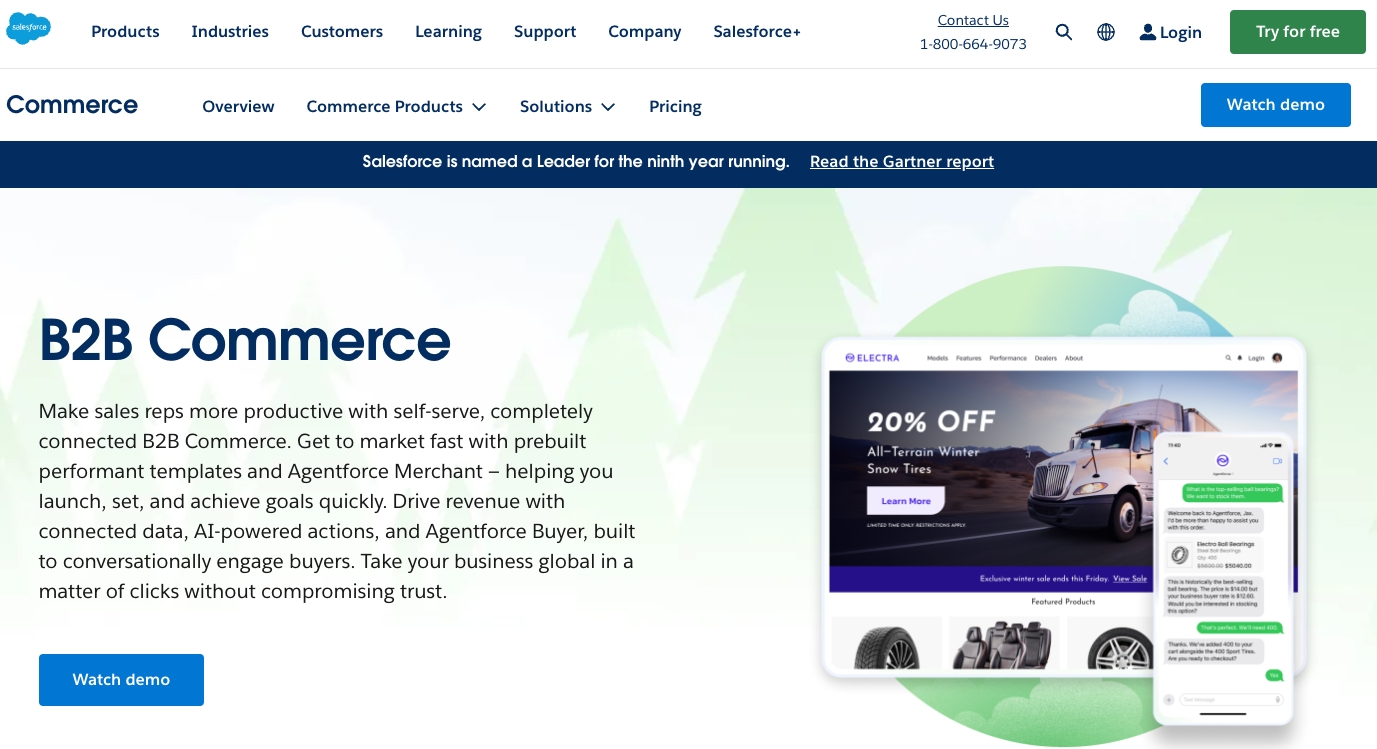Salesforce B2B Commerce simplifies and optimizes the B2B sales process. In this article we cover its key features and benefits, showing how you can boost your business efficiency and growth.
What is Salesforce B2B Commerce?
Salesforce B2B Commerce stands out by digitizing the selling process between businesses, offering self-service ordering, and significantly reducing service costs.
It is designed to adapt to various stages of business growth, whether you are a startup looking to establish an online presence or a mature enterprise aiming to optimize complex sales operations. This adaptability ensures that as your business evolves, Salesforce B2B Commerce evolves with you, providing scalable solutions to meet your unique needs.

The significant growth in global B2B ecommerce sales, with a 95% increase from 2020 to 2022, highlights the shift towards digital platforms as primary revenue channels. Salesforce B2B Commerce provides the necessary tools and capabilities to stay competitive during this digital transformation.
Key features of Salesforce B2B Commerce
Salesforce B2B Commerce is packed with features that are specifically designed to enhance the purchasing experience for businesses. These features not only streamline the buying process but also cater to the complex needs of B2B transactions.
At its core, Salesforce B2B Commerce offers a robust platform that supports multiple delivery dates, large volume purchases, and negotiated pricing, all of which are crucial for fostering strong business relationships and ensuring customer satisfaction.
These features make Salesforce B2B Commerce a powerful tool for enhancing operations and meeting diverse client needs. Below, we explore how these key features can benefit your business.
Multiple delivery dates
One of the standout features of Salesforce B2B Commerce is its support for multiple delivery dates. This functionality allows businesses to offer flexible shipping options, ensuring that customers receive their orders when they need them. Providing estimated delivery dates during checkout enhances transparency and assists buyers in planning more effectively.

Furthermore, Salesforce B2B Commerce accommodates intricate shipping logistics, enabling businesses to set various delivery schedules and locations for different parts of an order. This flexibility is particularly beneficial for businesses dealing with complex supply chains and diverse customer needs, ensuring a smoother and more efficient delivery process.
Large volume purchases
Handling large volume purchases efficiently is crucial in the B2B sector, and Salesforce B2B Commerce excels in this area. The platform is designed to manage bulk orders seamlessly, streamlining the purchasing process for businesses making large transactions. This capability is supported by tools like Cart Scale, which can effectively handle hundreds or even thousands of items in shopping carts.
Businesses handling large volume orders can greatly benefit from Salesforce B2B Commerce’s efficiencies. Automation and optimization of order processing workflows reduce complexity and errors, leading to cost savings and improved customer satisfaction through timely and accurate fulfillment.

Efficient bulk order management is vital for staying competitive in the B2B marketplace. Salesforce B2B Commerce’s robust capabilities allow businesses to meet customer demands effectively, ensuring a smooth purchasing experience.
Negotiated pricing
Negotiated pricing is another critical feature of Salesforce B2B Commerce, allowing businesses to establish tailored pricing agreements with their clients. This dynamic pricing capability enables businesses to create personalized pricing structures based on specific buyer needs and negotiations. By offering customized pricing, businesses can foster stronger relationships with their clients, ensuring that each buyer feels valued and understood.

Business buyers can access their negotiated pricing and service case data directly from their accounts on Salesforce B2B Commerce. This transparency and ease of access enhance the customer experience and facilitate smoother transactions.
Why choose Salesforce for B2B Commerce?
Salesforce for B2B commerce offers numerous benefits, including seamless integration with the Salesforce Lightning Platform. This allows smooth interoperability with other Salesforce applications within Salesforce Commerce Cloud, like Salesforce CRM, providing sellers a comprehensive view of customer activities and enhancing decision-making and customer relationship management.
Built natively on the Salesforce platform, Salesforce B2B Commerce allows businesses to leverage the full suite of Salesforce tools to optimize operations. Features like multiple payment options and enhanced navigation improve the overall shopping experience, while automated processes reduce errors and enhance order accuracy, leading to better customer satisfaction and streamlined operations.
Salesforce B2B Commerce also offers real-time insights and analytics, a significant improvement over traditional B2B commerce’s historical reporting methods, enabling data-driven decisions and maintaining competitiveness.

Comparing Salesforce B2B Commerce with traditional methods
Traditional B2B commerce often relies on outdated on-premise systems and manual processes like phone communications and paper-based order processing, which are time-consuming and prone to errors, leading to inefficiencies and dissatisfied customers.
In contrast, Salesforce B2B Commerce is built on a modern, cloud-based infrastructure, offering a more efficient and scalable solution for businesses. Salesforce B2B Commerce leverages automation and real-time data to streamline operations, reduce manual errors, and enhance overall efficiency, especially when integrated with Salesforce Commerce Cloud.
Feature | Salesforce B2B Commerce | Traditional B2B commerce |
Integration with CRM | Deep integration with Salesforce CRM for unified data. | Often requires custom integration. |
Customization and flexibility | High customization with Salesforce development tools. | Varies; often limited without custom code. |
Scalability | Scalable cloud infrastructure | May be limited by on-premises solutions. |
Analytics and reporting | Advanced analytics powered by Salesforce Einstein. | Basic analytics, often requires third-party solutions. |
Ecosystem and support | Extensive ecosystem with AppExchange. | Smaller ecosystems and varying support levels. |
Maintenance and updates | Regular updates and maintenance handled by Salesforce. | Often requires manual updates and maintenance. |
Costs | Higher upfront and ongoing costs due to premium features. | Lower cost but may incur hidden expenses. |
Transitioning to a trusted platform enhances order processing capabilities and provides a superior customer experience, driving revenue, growth and profitability.
Implementation steps for Salesforce B2B Commerce
The implementation process involves 3 main steps:
- Initial setup and configuration
- Customizing product catalogs
- Automating merchandising tasks.
These steps ensure efficient setup and allow businesses to leverage Salesforce B2B Commerce to enhance operations and meet customer expectations.
1. Initial setup and configuration
Initial setup and configuration of Salesforce B2B Commerce are streamlined for a quick start. The Commerce Setup Assistant guides users through setup, enabling store configuration in about 30 minutes, including creating a product catalog, assigning it to the store, and establishing user access controls with preconfigured permissions and profiles.
Salesforce B2B Commerce also supports bulk order uploads via CSV files, simplifying data entry for large quantities of products. This ensures businesses can start using the platform quickly, leveraging its benefits without extensive delays.
2. Customizing product catalogs
Customizing product catalogs allows businesses to tailor offerings to meet specific customer needs and market demands. Salesforce B2B Commerce provides tools to organize product data effectively, ensuring easy navigation for customers. Creating categories and subcategories within the catalog adopts a structured approach to product organization, facilitating better navigation.
Asynchronous data imports allow users to upload essential product and buyer data without affecting system performance, ensuring smooth and efficient customization. A well-organized product catalog enhances customer experience and drives sales efficiently.
3. Automating merchandising tasks
Automating merchandising tasks reduces manual errors and improves pricing, promotions, and inventory efficiency. Salesforce Commerce Cloud's tools streamline these operations, allowing businesses to focus on strategic initiatives. For example, the Bulk Order Processing Engine automates order handling, reducing manual processing time and errors.
Salesforce B2B Commerce supports splitting large orders into multiple shipments, improving logistics and fulfillment efficiency. Features like the Commerce Reorder Portal and rapid reordering enable quick repeat purchases, enhancing satisfaction and loyalty. Leveraging automation ensures a seamless and efficient ordering experience.
Use cases of Salesforce B2B Commerce
Salesforce B2B Commerce enhances customer experiences and operational efficiency through features like account-specific pricing, custom catalogs, and efficient reordering processes. These use cases demonstrate how the Salesforce platform drives improved customer satisfaction and business outcomes.
Let’s explore three specific use cases below.
Use case 1: Rapid reorders
Rapid reordering streamlines the purchasing process for regular customers, allowing them to quickly reorder previous purchases with just a few clicks. This saves time and enhances overall satisfaction and loyalty, leading to increased sales and repeat business.
Businesses can implement it by allowing customers to save their favorite products for one-click reordering in the future. This improves customer retention by making the purchasing experience seamless and efficient.
This feature is particularly beneficial for businesses that frequently receive repeat orders, as it simplifies the buying process and ensures customers can easily repurchase their preferred products.
Use case 2: Handling large volume orders
Efficiently handling large-volume orders is critical for meeting customer demands and maintaining a competitive edge. Salesforce B2B Commerce provides real-time inventory visibility during bulk order processing to ensure accurate fulfillment and prevent stockouts. Accurate inventory tracking allows efficient stock management, reducing the risk of fulfillment delays.
These features collectively enhance businesses’ ability to manage extensive orders effectively, improving customer satisfaction. Leveraging Salesforce B2B Commerce’s robust tools ensure a smooth and reliable purchasing experience.
Use case 3: Enhancing buyer experience
Enhancing the buyer experience is central to Salesforce B2B Commerce. Key features like multiple payment options and flexible order fulfillment capabilities significantly improve the purchasing process. Multiple payment options offer business buyers convenience and flexibility are enhancing the overall buyer experience.
Future of Salesforce B2B Commerce
The future of Salesforce B2B Commerce includes exciting developments like headless commerce and artificial intelligence. Headless commerce allows rapid and efficient customization of ecommerce experiences, while AI integration enhances productivity and operational efficiency by automating complex tasks.
Learn about the best headless commerce platforms.
Data management is becoming crucial for B2B organizations, as high-quality data is essential for maximizing AI benefits. Embedded commerce will simplify digital transformations by integrating transaction functionalities into existing sales and service processes.
These advancements will further enhance Salesforce B2B Commerce’s capabilities and effectiveness, enabling businesses to stay competitive in a constantly evolving market.
Conclusion
Salesforce B2B Commerce stands out as a powerful platform that streamlines B2B transactions, enhances customer experiences, and drives business growth. Its key features cater to the complex needs of B2B customers, ensuring a seamless and efficient purchasing process. The platform’s integration with Salesforce CRM and its robust automation capabilities further enhance operational efficiency and customer satisfaction.
Alokai stands out for its ready-made integration designed for Salesforce Commerce Cloud, streamlining the modernization process. With tailored implementation strategies, Alokai simplifies the setup and configuration of Salesforce B2B Commerce solutions, ensuring a smooth transition and quick time to market.
As the digital landscape continues to evolve, Salesforce B2B Commerce is well-positioned to lead the way with innovative solutions like headless commerce and AI integration.
By partnering with Alokai, businesses can effectively implement and optimize Salesforce B2B Commerce, ensuring they stay competitive and achieve their business goals. Embrace the future of B2B commerce with Salesforce and Alokai, and watch your business thrive.
